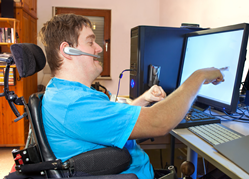
In its 2021 federal budget, the Trump administration included extreme funding cuts to programs helping disabled citizens including individuals with intellectual and developmental disabilities (IDD).
These individuals lean on the support of others to be able to participate in average activities, including things like cooking, getting dressed, and participating in work or social activities. When we see funding cuts, people with disabilities are at high risk of slipping through the cracks.
CLEARWATER, Fla. (PRWEB)
December 21, 2020
In its 2021 federal budget, the Trump administration included extreme funding cuts to programs helping disabled citizens including individuals with intellectual and developmental disabilities (IDD). This disaster in funding will not only cut the quality and length of services provided to those with IDD, but it could also place them in a position to lose everything they have. Individuals with IDD rely on consistent caregiver interactions to achieve quality of life goals while completing activities of daily living; if funding for these programs is cut, these people will suffer significant setbacks that could even lead to homelessness. “These individuals lean very heavily on the support of others to be able to participate in average activities, including things like cooking, getting dressed, and participating in work or social activities. When we see funding cuts, people with disabilities are at high risk of slipping through the cracks,” says Dr. Craig Escudé, President of Health Risk Screening.
As the current administration prepares to leave the White House, legislators have proposed several last-minute Social Security Disability Insurance (SSDI) funding cuts that would leave individuals with IDD without proper care. Today, almost half of all SSDI recipients under 50 years old have intellectual disabilities, and 75% of those over age 50 live with physical or intellectual impairments.(1) The latest proposals would slash funding for Social Security disability benefits by $2.6 billion over the next decade—plus, they would require millions of current beneficiaries to navigate through red tape to re-prove their disability status every two years.(2) The budget cuts will affect a variety of services provided to those living with IDD, such as state councils and university centers focused on developmental disabilities, access to qualified therapists and caregivers, and many protection and advocacy programs.(3) Centers serving individuals with IDD may be forced to turn these people away, and even medical professionals working with these particular individuals may lose their jobs due to lack of funding.
In the early 1980s, the Reagan administration enacted similar measures in what has become known as the “Reagan disability purge”. Beneficiaries living with conditions like Down syndrome, cerebral palsy, and even end-stage cancer were informed they were no longer considered disabled, and, as a result, millions lost their disability benefits.(4) Tragically, thousands committed suicide, and thousands more lost access to programs and services that helped them live as normally as possible in society.(4) History would repeat itself if Trump’s proposed cuts move forward. People living with IDD may lose access to monetary benefits, housing, professional caregiving services, and more.
Already, many agencies who support people with IDD aren’t able to provide a basic level of support and services because they cannot pay for enough staff members and other necessities. Additionally, many centers are shifting focus away from budget constraints to providing the COVID-19 vaccine to high-risk individuals, many of whom have intellectual disabilities.
People who live with IDD do best with routines involving support from people who understand them and know them personally, including how they communicate things like pain or discomfort. These support givers know how to watch for the early signs of medical illness, which may vary greatly from individuals without IDD. Legislators could greatly benefit by personally visiting centers for people with IDD to inform themselves about the challenges and struggles these people face on a daily basis while witnessing the high level of support and attention paid to each person.
Dr. Escudé says, “Funding cuts may force people with IDD to lose support from people who know them well or have to change their living arrangements completely. This will increase the risk of serious health conditions being unnoticed which can lead to unneeded suffering and even death. I call on legislators and those in power to visit programs and hold hearings to learn from people with disabilities and their supporters what is truly at risk before cutting funding.”
About Health Risk Screening, Inc.:
Health Risk Screening, Inc.’s roots began in 1992. HRS is an industry leader in training courses, webinars, and materials to help at-risk populations. HRS’s focus is on developing tools and training for the person-centered support of these vulnerable populations. Through the education of government agencies and service providers, HRS aims to improve lives. One such tool is the Health Risk Screening Tool, of which HRS is the sole developer, producer, and distributor. The web-based HRST is the most widely used and validated health risk screening instrument for people with intellectual and developmental disabilities. With unrelenting focus, HRS works to fulfill its mission of improving the health and quality of life for people faced with these types of vulnerabilities. For more information, visit http://www.hrstonline.com.
1. “Chart Book: Social Security Disability Insurance.” Center on Budget and Policy Priorities, 22 Sept. 2020, cbpp.org/research/social-security/chart-book-social-security-disability-insurance.
2. Vallas, Rebecca. “Trump Administration Cuts to Social Security Disability Benefits among the Cruelest.” USA Today, Gannett Satellite Information Network, 29 Jan. 2020, usatoday.com/story/opinion/todaysdebate/2020/01/27/trump-administration-cuts-disability-benefits-among-cruelest-editorials-debates/4592737002/.
3. “Trump Budget Calls For Cuts To Disability Programs.” Disability Scoop, 13 Feb. 2020, disabilityscoop.com/2020/02/13/trump-budget-calls-for-cuts-to-disability-programs/27812/.
4. Eberle, Marie. “Is The Next ‘Disability Purge’ Underway?” Medium, Feministly, 28 Jan. 2020, medium.com/feministly/is-the-next-disability-purge-underway-c963de53f842.
Share article on social media or email:

